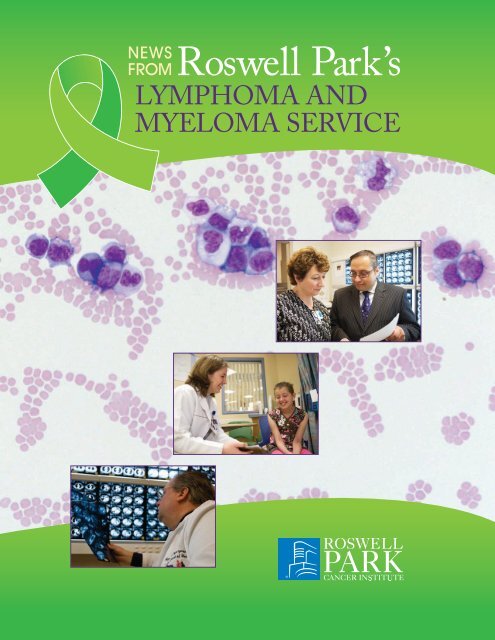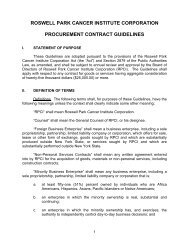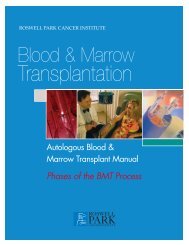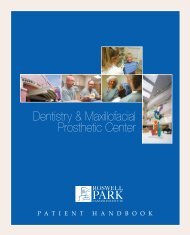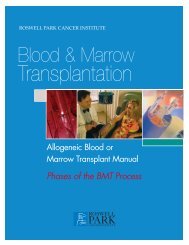Lymphoma and Myeloma Newsletter - Roswell Park Cancer Institute
Lymphoma and Myeloma Newsletter - Roswell Park Cancer Institute
Lymphoma and Myeloma Newsletter - Roswell Park Cancer Institute
You also want an ePaper? Increase the reach of your titles
YUMPU automatically turns print PDFs into web optimized ePapers that Google loves.
NEWSFROM<strong>Roswell</strong> <strong>Park</strong>’sLYMPHOMA ANDMYELOMA SERVICE
MEET THE LYMPHOMA & MYELOMA TEAMThe <strong>Lymphoma</strong> <strong>and</strong> <strong>Myeloma</strong> Service at <strong>Roswell</strong> <strong>Park</strong> <strong>Cancer</strong> <strong>Institute</strong> (RPCI)is dedicated to providing outst<strong>and</strong>ing clinical care, participating in cutting-edgeclinical <strong>and</strong> laboratory research, <strong>and</strong> developing more effective treatments for allpatients with the following hematologic malignancies:Non-Hodgkin lymphoma (NHL)Hodgkin lymphoma (HL)Chronic lymphocytic leukemia (CLL)Multiple myeloma (MM) <strong>and</strong>other plasma cell disorders(e.g., Waldenstron’smacroglobulinemia)The lymphoma <strong>and</strong>myeloma team at our <strong>Institute</strong>includes physicians, scientists,hematopathologists, radiologists, radiationoncologists, fellows, nurse practitioners,physician assistants, pharmacists, socialworkers, clinical nurses, research coordinators<strong>and</strong> psychologists working as a cohesive group ofprofessionals dedicated to providingcompassionate <strong>and</strong> high-quality care for ourpatients <strong>and</strong> to advancing our underst<strong>and</strong>ing<strong>and</strong> treatment of hematologicmalignancies.Our physicians are active memberson committees in such nationalorganizations as:• The National Comprehensive<strong>Cancer</strong> Network (NCCN): longtermmonitoring of lymphomapatients participating in the<strong>Lymphoma</strong> Outcomes Database;memberships on individual NHL,HL, <strong>and</strong> <strong>Myeloma</strong> TherapyGuidelines Committees• The Alliance for Clinical Trials inOncology (formerly the <strong>Cancer</strong><strong>and</strong> Leukemia Group B (CALGB)national cooperative group)Myron S. Czuczman, MDChief, <strong>Lymphoma</strong> <strong>and</strong> <strong>Myeloma</strong> Service(Department of Medicine)Head, <strong>Lymphoma</strong> Translational ResearchLaboratory (Departmentof Immunology)Professor, MedicalOncology <strong>and</strong>HematologyFrancisco J. Hern<strong>and</strong>ez-Ilizaliturri, MDAssociate Professor, Medical Oncology<strong>and</strong> Tumor ImmunologySeema Bhat, MDAssistant Professor, Medical Oncology<strong>and</strong> HematologyKelvin Lee, MDProfessor, Medical Oncology, Hematology<strong>and</strong> Tumor Immunology; Jacobs Family Chairin ImmunologyVishala Neppalli, MDAssistant Professor, PathologyGeorge Deeb, MDAssistant Professor, Pathology <strong>and</strong> Laboratory MedicineDirector, Hematopathology LaboratoryAssociate Director, Flow<strong>and</strong> Image CytometryPetr Starostik, MDAssociate Professor, PathologyBora Baysal, MD, PhDAssociate Professor, PathologyAnneMarie Block, PhDAssociate Professor, OncologyDirector, CytogeneticsSheila Jani Sait, PhDAssistant Professor, OncologyPaul Wallace, PhDDirector, Flow & Image CytometryAssociate Professor, PathologyMihai Merzianu, MDAssistant Professor, Pathology2 | 1-800-ROSWELL (1-800-767-9355)
PATHOLOGYA KEY PRIORITYTaking diagnosis to a new levelAt RPCI, a dedicated team of board-certified hematopathologists performs stateof-the-artintegrated diagnostic hematopathology—essential to diagnosing <strong>and</strong>classifying hematolymphoid neoplasms according to the most recent WHOclassification.“Pathology is not just looking at cells under the microscope anymore,” saysGeorge Deeb, MD, Assistant Professor, Director of Hematopathology,Department of Pathology & Laboratory Medicine; <strong>and</strong> Associate Director, Flow<strong>and</strong> Image Cytometry. “The integrated diagnostic approach is based oncomprehensive clinical, morphologic, immunophenotypic, cytogenetic <strong>and</strong>molecular genetic studies of lymph node, bone marrow, blood <strong>and</strong> otherextranodal <strong>and</strong> extramedullary tissue samples.”Our hematopathologists work closely with the <strong>Lymphoma</strong> clinical team <strong>and</strong> withother ancillary laboratories at RPCI to expedite prompt, comprehensiveassessments. The ancillary laboratories incorporate the following:bone marrow laboratoryimmunohistochemistry laboratory withwide arrays of markers availableflow <strong>and</strong> image cytometry laboratory withspectrum of comprehensive panels of markersto thoroughly characterize hematolymphoidneoplasms immunophenotypicallycytogenetic laboratory with karyotypic analysis<strong>and</strong> large number of FISH probes for many typesof genetic abnormalitiesmolecular diagnostic laboratory with a plethoraof PCR <strong>and</strong> sequencing-based analysesGOING with the FLOWRPCI’s Flow <strong>and</strong> Image Cytometry Facility—recognizedas one of the nation’s first <strong>and</strong> finest—analyzes cellsamples for RPCI clinicians <strong>and</strong> researchers, leadinghealth centers <strong>and</strong> many National <strong>Institute</strong>s of Healthclinical studies. This unique facility specializes inleukemias <strong>and</strong> lymphomas, identifying specific cancertypes <strong>and</strong> subtypes by determining the specific antigenexpression of the tumor using analyses with antibodies<strong>and</strong> sophisticated laser-activated flow cytometry.“This integrated diagnostic approach allows us tocharacterize the tumor’s fingerprint,” says Dr. Deeb,“<strong>and</strong> provides the most accurate classification that iscritical for planning treatment <strong>and</strong> predicting therapyresponse <strong>and</strong> survival.”www.roswellpark.org | 3
it’spersonal:targeting treatmentto each patientIt’s a new era for lymphoma treatment, <strong>and</strong> it’s an excitingtime to be a part of it, according to Myron Czuczman, MD,Chief, <strong>Lymphoma</strong>/<strong>Myeloma</strong> Service <strong>and</strong> Head, <strong>Lymphoma</strong>Translational Research Laboratory, Department ofImmunology. The advent of targeted therapies such asmonoclonal antibodies—for example, rituximab, whichtargets a surface protein, CD20, on B-cell lymphomas, CLL<strong>and</strong> related diseases—have revolutionized the manner inwhich we approach everything from initial diagnosis,pathology, <strong>and</strong> treatment planning to prognosisassessments. “What has happened,” explains Dr. Czuzcman,“is that we can now examine the cancer cell, not only at itssurface, but also at the molecular level, thanks to specializedPCR cytogenetics <strong>and</strong> flow cytometric techniques. We canidentify unique molecular characteristics (e.g., expression ofcertain surface proteins, specific pathways that may beupregulated, chromosomal rearrangements or otherdistinguishing molecular features). We are now developingagents that target or attack these particular features of thecancer cell, thereby directing therapy largely to the tumorcell <strong>and</strong> limiting effects on healthy tissue.”Personalizedmedicinebecomingthe st<strong>and</strong>ardIn the past, even with a diagnosis of a specific lymphomatype, a patient would receive the same therapy given for allsubtypes. “We don’t do that anymore,” says Dr. Czuczman.“Now we look at not only the diagnosis, but also themolecular profile of the cancer, which may be very different in two patients with the exact same diagnosis.”The team then determines whether the patient’s cancer has a profile that can be targeted with a drug thatthat works against certain very critical proteins, pathways or molecules in that specific lymphoma. Thesetargeted approaches are more effective against the cancer, <strong>and</strong> they are less toxic, with fewer side effectsthan st<strong>and</strong>ard systemic chemotherapy regimens.For certain patients, adding rituximab to, or substituting it for, some of the more toxic therapies has madea huge impact. RPCI is involved in developing the next generation of these antibodies, like an anti-CD19<strong>and</strong>/or an anti-CD22. A new anti-CD30 has just been approved. In addition to binding to the intendedtargets, these new agents are also internalized by the cancer cells, making them optimal delivery systemsfor additional cancer-killing agents such as chemotherapy, toxins, or radioactive isotopes.4 | 1-800-ROSWELL (1-800-767-9355)
PROGNOSIS IS PART OFTREATMENT PL ANNINGBloodMarrowANDTransplantTHEP R O G R A MA CENTER OFEXCELLENCEAt RPCI, the <strong>Lymphoma</strong> <strong>and</strong> <strong>Myeloma</strong> team looks at the whole picture whenassessing a patient’s prognosis, including pathology, radiology, staging, symptoms<strong>and</strong> laboratory values, to predict whether a patient will do well with st<strong>and</strong>ard therapyor need more aggressive treatment—from the start. “The best chance of curing apatient is choosing the best <strong>and</strong> optimal therapy as the first treatment, rather thantrying to salvage with second or subsequent therapies later on,” says Dr. Czuczman.THE RPCI EDGEThe challenge is to choose the appropriate combination of therapies for the specificpatient—a choice based on sound, logical evidence. As a comprehensive cancercenter that’s intimately involved in the research <strong>and</strong> development of these newtherapies—<strong>and</strong> determining how best to optimize their benefits—RPCI is uniquelyequipped to meet that challenge for each patient. The aim of underst<strong>and</strong>ing eachpatient’s disease is a concerted effort involving surgeons (who do the biopsies) <strong>and</strong>experienced hematopathologists, was work with colleagues from Cytogenetics, theLaboratory of Molecular Diagnostics, <strong>and</strong> the Department of Flow Cytometry, withinvaluable input from the Diagnostic Radiology <strong>and</strong> Nuclear Medicine departments.The Blood <strong>and</strong> Marrow Transplant (BMT) Programat RPCI performs approximately 100 to 120blood <strong>and</strong> marrow transplants each year, treatingpatients with hematologic disorders includingacute <strong>and</strong> chronic leukemias, aplastic anemia,Hodgkin <strong>and</strong> non-Hodgkin lymphoma, multiplemyeloma, myelodysplastic syndrome <strong>and</strong>selected solid tumors.RPCI’s BMT unit was designed for patient safety<strong>and</strong> comfort. The unit, <strong>and</strong> its 14 private patientrooms, are HEPA-filtered to maintain the highestprotection against airborne pathogens. Thenursing staff is specially trained in themanagement <strong>and</strong> care of immunocompromisedBMT patients <strong>and</strong> their special needs.www.roswellpark.org | 5
thewayforwardLYMPHOMA AND MYELOMA INTERDISCIPLINARY AND TRANSLATIONAL RESEARCH PROGRAMOur group of clinicians <strong>and</strong> scientists focuses on studying thebiology of B-cell <strong>and</strong> T-cell malignancies in an attempt todevelop novel therapeutic strategies <strong>and</strong>/or biomarkersthat can be used as surrogate markers of response. Usinglaboratory models, we aim to underst<strong>and</strong> how the patient’s immunesystem <strong>and</strong> biologically designed therapies—monoclonal antibodies,immunomodulatory drugs or small molecules—interact with lymphomacells. The ultimate intent is to design <strong>and</strong> carry out clinical trials forpatients with lymphoma <strong>and</strong> multiple myeloma. “Several clinical studiesat our institute are evaluating <strong>and</strong> testing novel therapeutic strategies inpatients with B-cell or T-cell lymphoma,” says Francisco Hern<strong>and</strong>ez-Ilizaliturri, MD, Associate Professor of Oncology in the<strong>Lymphoma</strong>/<strong>Myeloma</strong> Service <strong>and</strong> the Department of Immunology.The <strong>Lymphoma</strong> Translational Research Laboratory focuses onthree major areas:• Underst<strong>and</strong>ing the molecular basis for developing resistance torituximab in patients with B-cell lymphoma• Developing strategies to enhance the anti-tumor activityof rituximab <strong>and</strong> other monoclonal antibodies against lymphoma,using targeted specific molecules• Identifying of biomarkers of response to currentavailable therapies in patients with B-cell lymphomaAs treatment options for patients with lymphomas <strong>and</strong> relatedneoplasms become more diverse <strong>and</strong> complex, it is imperative toidentify <strong>and</strong> validate biomarkers that can be utilized to predict responseto a given specific therapy. Tailoring the selection of a specific treatmentbased on biomarkers has the potential to increase the percentage ofpatients who will respond to that treatment <strong>and</strong> who are most likely togain clinical benefit. To date, we have investigated the followingpredictive markers:• Using Han’s algorithm to identify patients with relapsed/refractoryDLBCL most likely to benefit from lenalidomide therapy• MUM-1 expression in patients with newly diagnosed DLBCLtreated with chemo-immunotherapy at our <strong>Institute</strong>• The prognostic predictive value of functional imaging at the time ofinitial diagnosis in the outcome of patients with follicular lymphoma• CD5 expression as a biomarker of clinical outcome in patients withnewly diagnosed mantle cell lymphoma (MCL) treated at RPCI• IRF-8 expression in DLBCLIn collaboration with the members of the <strong>Lymphoma</strong> Section <strong>and</strong> theDepartments of Medicine <strong>and</strong> Immunology we have been able toestablish a prestigious <strong>and</strong> scientifically respected <strong>Lymphoma</strong>Translational Research Program that is actively contributing to the fieldof novel “targeted” therapies of hematologic malignancies <strong>and</strong> iscapable of advancing “bench” findings into rationally designed clinicaltrials for patients suffering from lymphoma <strong>and</strong> related neoplasms.Several clinical studies at our <strong>Institute</strong> areevaluating <strong>and</strong> testing novel therapeutic strategiesin patients with B-cell or T-cell lymphoma.—Francisco Hern<strong>and</strong>ez-Ilizaliturri, MD6 | 1-800-ROSWELL (1-800-767-9355)
DevelopingstrategiesagainstnewMULTIPLE MYELOMAMultiple myeloma (MM), a cancer ofplasma cells (PC), normally the source ofantibodies that protect against infection, is thesecond most prevalent hematologic malignancy afternon-Hodgkin lymphoma in the United States. Just like their normal PCcounterparts, MM cells are critically dependent on their interactions with normal cells within the bonemarrow (called bone marrow stromal cells (BMSC)) for their survival. Kelvin Lee, MD, Professor ofOncology <strong>and</strong> Chair, Department of Immunology, <strong>and</strong> his lab team are investigating the molecular <strong>and</strong>biochemical nature of the interaction between myeloma cells <strong>and</strong> the BMSC, in order to develop a newapproach to attacking myeloma cells—not directly, but through the “soil” in which they grow.The Lee lab was one of the first to recognize that a specific cell surface receptor, called CD28, bestcharacterized in T cells, is essential for myeloma cell survival. The lab’s investigators are now studyingnovel treatment strategies that block the interaction between the CD28 receptor on multiple myelomacells <strong>and</strong> CD80/CD86 lig<strong>and</strong>s on the pro-survival stromal cells in the bone marrow microenvironment.This approach aims to kill myeloma cells <strong>and</strong> sensitize the remaining cells to chemotherapy.Dr. Lee is also developing new vaccine strategies against myeloma, using novel vaccines developed <strong>and</strong>clinically tested by the RPCI Center for Immunotherapy. These are combined with small-molecule agentsthat can reverse the immune system suppression caused by multiple myeloma. “There is evidence thatthe immune system can control multiple myeloma,” says Dr. Lee. “Anti-myeloma vaccines may haveconsiderable promise in early-stage patients, or in patients with a minimal amount of residual disease.”ClinicalPharmacySupportRPCI’s clinical pharmacy specialists work closely with physicians, nurse practitioners <strong>and</strong>physician assistants in both inpatient <strong>and</strong> ambulatory care settings to provide optimalpharmaceutical care to patients. Two clinical pharmacists are dedicated to the<strong>Lymphoma</strong>/<strong>Myeloma</strong> Service to monitor all therapeutic drugs, provide recommendationsfor growth factor support, antiemetics <strong>and</strong> pain control, offer medication reviews <strong>and</strong>patient discharge counseling, <strong>and</strong> staff a 24-hour hotline to offer drug information,interaction checks, dosing recommendations for renal <strong>and</strong> hepatic insufficiencies, <strong>and</strong> more.www.roswellpark.org | 7


